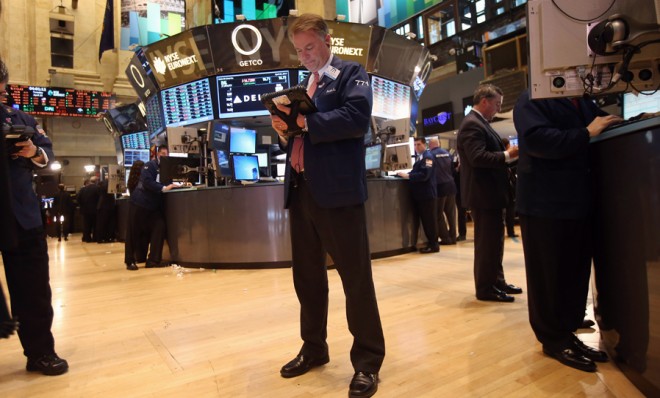How Twitter fueled a market swoon
A fake report posted by hackers on the Associated Press Twitter feed caused the S&P 500 to drop 0.9 percent

A free daily email with the biggest news stories of the day – and the best features from TheWeek.com
You are now subscribed
Your newsletter sign-up was successful
A single tweet can be enough to cause a stock market crisis, says Christopher Matthews at TIME. We learned that last week, when hackers posted a fake report on the Associated Press Twitter feed claiming that Barack Obama had been injured in an explosion at the White House. The AP quickly flagged the tweet as fake, but not before it "sent shock waves through the market," causing the S&P 500 to drop 0.9 percent and temporarily wiping out $136 billion in stock value. The real culprit behind this latest "flash crash" isn't a hacker — it's "the proliferation of high-frequency trading." Wall Street firms use computer algorithms to make millions of trades per second, triggered by automated scans of news sources- — including Twitter — for specific words or phrases. They make money, but "when the going gets tough, these computers tend to sell quickly and run for the hills, actually reducing liquidity when the market needs it most."
Don't blow this out of proportion, say Jared Keller and Evan Applegate at Businessweek. Cases of false tweets and news reports wreaking havoc on the markets are rare. In 2011, for instance, Apple shares dipped just 1 percent (and quickly rebounded) after a false report said that Apple founder Steve Jobs had died. And when a Twitter account impersonating prominent short-seller David Einhorn tried to "induce fluctuations" in Herbalife's stock in February, the company's value underwent "no noticeable change." Still, the AP episode "highlights the potential pitfalls of relying on social networks for tradable information," especially on the heels of the Securities and Exchange Commission's announcement that companies can use social media sites, including Twitter and Facebook, "to share market-moving company announcements."
The solution is better security, says Caleb Garling in the San Francisco Chronicle. The First Amendment "prevents the government from controlling what users say on Twitter," but regulators can make social media firms beef up their protocols. False information "has the potential to be damaging to more than the financial world." Just imagine: "If the hacked AP tweet had been more believable and not as easy to discredit — say, 'U.S. Navy moving into strategic positions around North Korea' — a global emergency could have ensued." The technology sector may disdain regulation, but "other kinds of information, such as financial and health-care data, are already strictly regulated by law." It's up to the consumer to decide what to trust on Twitter, but messages shouldn't be so easy to fake.
The Week
Escape your echo chamber. Get the facts behind the news, plus analysis from multiple perspectives.

Sign up for The Week's Free Newsletters
From our morning news briefing to a weekly Good News Newsletter, get the best of The Week delivered directly to your inbox.
From our morning news briefing to a weekly Good News Newsletter, get the best of The Week delivered directly to your inbox.
"Other than self-restraint, which is in short supply these days, nothing much can be done to prevent any of this," says George Packer at The New Yorker. Social media sites will seek new means to "spread information, for better and worse, farther and faster than the Spanish flu." And unless regulators crack down on high-frequency traders, they "will go on using algorithms that turn milliseconds of information advantage into huge profits" — even if that information is wrong.
A free daily email with the biggest news stories of the day – and the best features from TheWeek.com
Sergio Hernandez is business editor of The Week's print edition. He has previously worked for The Daily, ProPublica, the Village Voice, and Gawker.
-
 The ‘ravenous’ demand for Cornish minerals
The ‘ravenous’ demand for Cornish mineralsUnder the Radar Growing need for critical minerals to power tech has intensified ‘appetite’ for lithium, which could be a ‘huge boon’ for local economy
-
 Why are election experts taking Trump’s midterm threats seriously?
Why are election experts taking Trump’s midterm threats seriously?IN THE SPOTLIGHT As the president muses about polling place deployments and a centralized electoral system aimed at one-party control, lawmakers are taking this administration at its word
-
 ‘Restaurateurs have become millionaires’
‘Restaurateurs have become millionaires’Instant Opinion Opinion, comment and editorials of the day